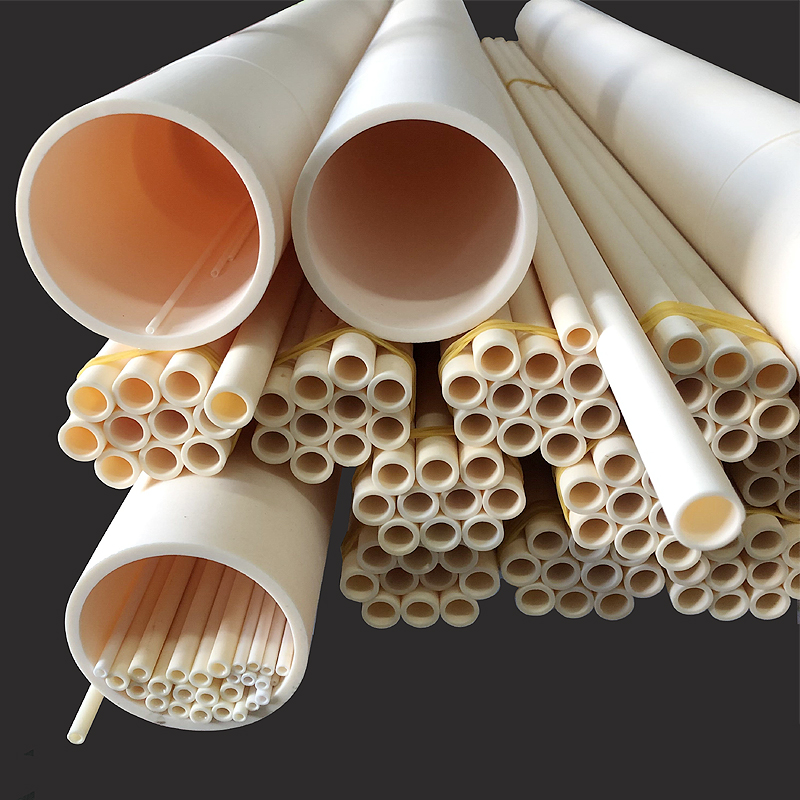Tubi in ceramica di alluminastanno rapidamente guadagnando popolarità in diversi settori grazie alle loro straordinarie proprietà e ai numerosi vantaggi. Questi tubi, realizzati in allumina ad alta purezza (Al2O3), offrono una combinazione unica di resistenza meccanica, stabilità termica e resistenza chimica, rendendoli la scelta ideale per applicazioni impegnative. Questo articolo approfondisce i vantaggi ditubi in ceramica di alluminae analizza i motivi per cui stanno diventando un materiale preferito in molti settori.
1. Eccezionale resistenza meccanica
Uno dei vantaggi più notevoli ditubi in ceramica di alluminaè la loro eccezionale resistenza meccanica. Le ceramiche di allumina possiedono un'elevata resistenza alla compressione, che consente a questi tubi di sopportare carichi significativi senza deformarsi o rompersi. Questa proprietà li rende particolarmente adatti all'uso in ambienti ad alta pressione, dove materiali tradizionali come metallo o plastica potrebbero cedere. Inoltre, le ceramiche di allumina presentano un'eccellente durezza e resistenza all'usura, garantendo una maggiore durata anche in condizioni abrasive.
2. Stabilità termica superiore
Tubi in ceramica di alluminaSono rinomate per la loro superiore stabilità termica. Possono operare a temperature estremamente elevate, spesso superiori a 1500 °C, senza compromettere la loro integrità strutturale. Questo le rende la scelta ideale per applicazioni che comportano temperature estreme, come forni, fornaci e apparecchiature di lavorazione ad alta temperatura. Inoltre, le ceramiche di allumina hanno un basso coefficiente di dilatazione termica, il che significa che non si espandono o si contraggono in modo significativo con le variazioni di temperatura, riducendo così il rischio di shock termici e garantendo la stabilità dimensionale.
Un altro vantaggio significativo ditubi in ceramica di alluminaè la loro eccellente resistenza chimica. Le ceramiche di allumina sono altamente resistenti alla corrosione e alla degradazione causata da acidi, alcali e altre sostanze chimiche aggressive. Questo le rende adatte all'uso in ambienti chimici aggressivi, dove altri materiali potrebbero corrodersi o deteriorarsi. Settori come l'industria chimica, petrolchimica e il trattamento delle acque reflue traggono grandi vantaggi dall'uso di tubi in ceramica di allumina, poiché garantiscono longevità e affidabilità in condizioni corrosive.
Le ceramiche di allumina sono note per le loro eccellenti proprietà di isolamento elettrico. Hanno un'elevata rigidità dielettrica, che le rende la scelta ideale per applicazioni elettriche ed elettroniche.Tubi in ceramica di alluminaSono utilizzati come isolanti in ambienti ad alta tensione, garantendo la sicurezza e prevenendo guasti elettrici. Le loro proprietà isolanti li rendono adatti anche per l'uso in sensori, processi di semiconduttori e altri componenti elettronici.
Nel settore medico e farmaceutico la biocompatibilità è un fattore cruciale.Tubi in ceramica di alluminaSono biocompatibili, ovvero non provocano reazioni avverse a contatto con i tessuti biologici. Questa proprietà li rende adatti all'uso in dispositivi medici, impianti e apparecchiature per la lavorazione farmaceutica. La biocompatibilità delle ceramiche di allumina ne garantisce l'utilizzo in sicurezza in applicazioni che richiedono il contatto diretto o indiretto con il corpo umano.
Tubi in ceramica di alluminaOffrono diversi vantaggi ambientali rispetto ai materiali tradizionali. La loro lunga durata riduce la necessità di sostituzioni frequenti, riducendo al minimo la produzione di rifiuti. Inoltre, il processo di produzione delle ceramiche di allumina è relativamente ecocompatibile, con emissioni e consumi energetici inferiori rispetto alla produzione di metalli e materie plastiche. Ciò è in linea con la crescente attenzione alla sostenibilità e alla responsabilità ambientale nelle pratiche industriali.
La versatilità ditubi in ceramica di alluminaUn altro vantaggio significativo. Possono essere realizzati in diverse dimensioni, forme e configurazioni per soddisfare specifici requisiti applicativi. Questa flessibilità li rende adatti a un'ampia gamma di settori, tra cui aerospaziale, automobilistico, elettronico, sanitario ed energetico. Che vengano utilizzati in forni ad alta temperatura, reattori chimici o isolanti elettrici, i tubi in ceramica di allumina offrono prestazioni costantemente affidabili.
Tubi in ceramica di alluminaStanno rivoluzionando le applicazioni industriali con le loro proprietà eccezionali e i numerosi vantaggi. La loro resistenza meccanica, stabilità termica, resistenza chimica, isolamento elettrico, biocompatibilità, vantaggi ambientali e versatilità li rendono una scelta eccellente per ambienti difficili. Mentre le industrie continuano a ricercare materiali in grado di resistere a condizioni difficili mantenendo prestazioni e longevità,tubi in ceramica di alluminasono destinate a svolgere un ruolo cruciale nel futuro dell'innovazione industriale.


